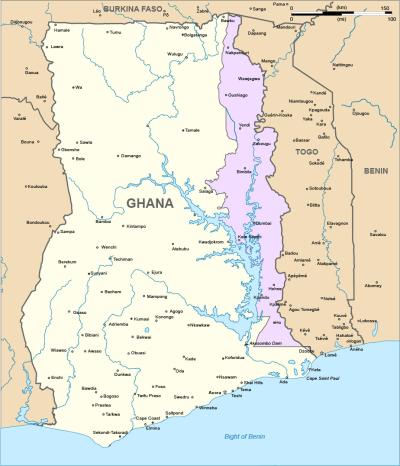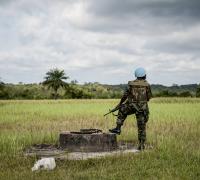A nascent ‘secessionist’ challenge for Ghana?
Ethnic violence and secessionism have not played a strong role in West Africa’s political landscape of numerous challenges. Now, Ghana, just before elections in December 2020, has witnessed attempts by groups in its eastern Volta Region to establish their own state – Western Togoland. How serious is it, and what does it mean for the region? In this article, Kwesi Aning provides insight.
When Ghana gained independence from Britain on 6 March 1957, its first Prime Minister and subsequent President, Kwame Nkrumah, sought to build a strong unitary state. In consonance with this project, he embarked on an aggressive integrationist program to unify Ghana’s diverse ethnic groups and position the country as the beacon of continental emancipation. Unsurprisingly, he won recognition as the African of the 20th century. But herein lies the inherent contradictions of the immediate post-independence period of hope and optimism. The integrationist state vision has been tinkered with: revised, discarded, forgotten and often-times caricatured. Tensions and misinterpretations arising from earlier political decisions have occasionally resurfaced to pose security and political irritations to changing governments – and therefore swatted and forgotten.
However, a minority who feel that their concerns are disregarded by the ruling elite in Accra, justifiably or unjustifiably so, has started to agitate. From complaints, demonstrations, arrests, construction of signposts, threats of violence, and eventually to the actual initiation of violence, their agitation has resulted in destruction and seizures of state properties.
This article discusses the domestic and regional security implications of what seems to be a successful first attack by a secessionist group against Ghana in terms of: (a) Choice of targets; (b) Geographical spread, encompassing Ho, Juapong, Sogakope, Aveyime and Mepe; (c) Duration; and (d) Impact.
Domestic implications
The Western Togoland Restoration Front (WTRF), one of several groups agitating for Western Togoland’s independence, staged spontaneous, well-coordinated and synchronized attacks in various parts of Ghana’s Volta region on 25 September 2020. Ghanaians were confronted with news previously associated with Liberia, Sierra Leone, La Côte d’Ivoire and more recently Mali and Burkina Faso that towns in the Volta Region bordering the Republic of Togo had been taken by a secessionist group. Attacking selected police stations at Aveyime, they freed inmates, locked up officers on duty and stole 14 AK 47 assault and five pump action rifles, before subsequently attacking Mepe and the North Tongu District Assembly. Police personnel were overwhelmed, two district assembly vehicles and a police vehicle seized and driven around as those taking it were singing patriotic songs and declaring the freedom of Western Togoland. So far, most of the seized and stolen items have not been retrieved. Furthermore, Juapong, a major town near Ghana’s main hydroelectric power dam, was occupied, as was Sogakokpe.
Among these groups, the Western Togoland Restoration Front (WTRF) has already declared independence for Western Togoland. However, these actions are opposed by the Peoples’ Liberation Council (PLC), also of Western Togoland, which has distanced itself from the secessionist activities of WTRF. Order, restored through military and police operations, have been criticized for resulting in ‘brutalities…against unarmed citizens’, and complaints have been forwarded to various international bodies and NGOs, including the UN, AU and Amnesty International. This projects a particularly negative image of Ghana’s security forces that otherwise are well-respected internationally for their role in UN peacekeeping missions.
In the aftermath of the attacks by the Western Togoland Restoration Front (WTRF), the Volta Regional Minister, Dr. Archie Letsa, explained to a skeptical public that: “We are monitoring their activities and we know what they are up to. We have intelligence on the ground, and I can assure you that it is only today that they have come out boldly…We are on top of the issue’. Letsa further argued that the “disturbance did not come as a surprise to security agencies in the area as they were aware of their intentions.” However, sixty hours later another daring attack occurred, this time in the regional capital of Ho. The explanation was that, “we were taken by surprise,” because “[we] have not mounted a security post here [at the State Transport Corporation], that is why they have taken it at the blindside. We didn’t know they will attack the [State Transport Corporation] yard.” The response: an immediate suspension of transportation services to the region.
Subsequently, 40 or so members of the Western Togoland Restoration Front (WTRF) have been arrested and helicoptered to Accra. A government press conference has debunked public criticism of intelligence failure on the part of the security services. Government, however, has admitted that, “there are still immediate threats posed by the secessionist group Western Togoland Restoration Front.” As these events unfold in the coming weeks and months, it will become clearer whether secessionism will pose a real threat to Ghana’s cohesion in the longer-term.
Regional dimensions
According to a member of the Foreign Affairs Committee of Ghana’s parliament, Okudzeto Ablakwa: “If our leaders don’t take this threat seriously and use superior intelligence gathering to counter and nib this in the bud, this has the potential of destabilizing not only parts of the Volta Region but the whole country.” In addition, these events have the potential to strain Ghana’s relationship with its neighbours. For instance, Togo has been accused of providing training grounds for the attackers, indeed, there are rumors that they were in fact Togolese. Neighboring Burkina Faso that has been practically overrun by extremists, and La Cote d’Ivoire that has just had their contentious elections in late October 2020, put pressure on Ghana’s stability, which a secessionist group, possibly backed by Togo, only reinforces.
All is not yet lost. With maturity and a focus on building a more inclusive and responsive state, an initial quiet backdoor should be sought, contacts made and a process of listening to each other’s concerns initiated.


